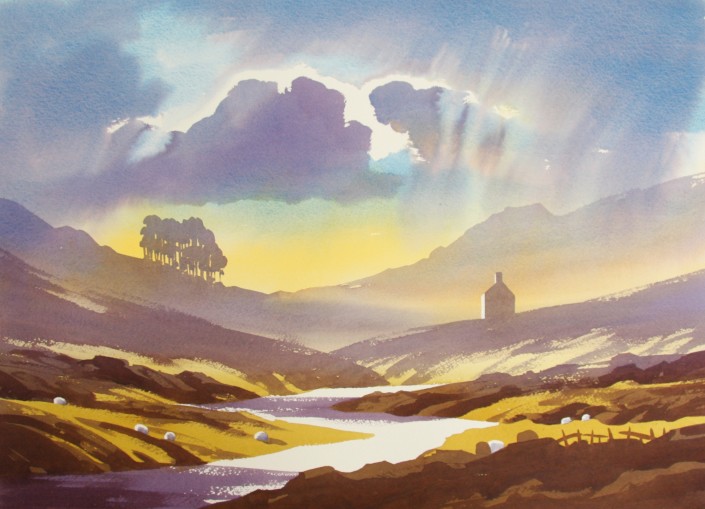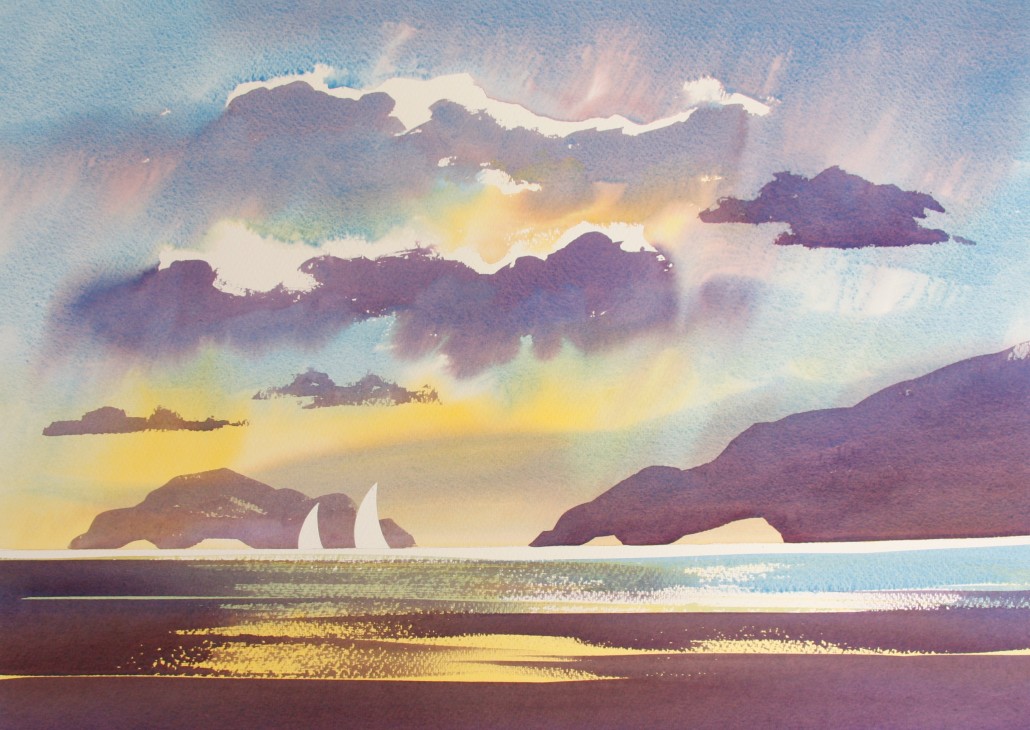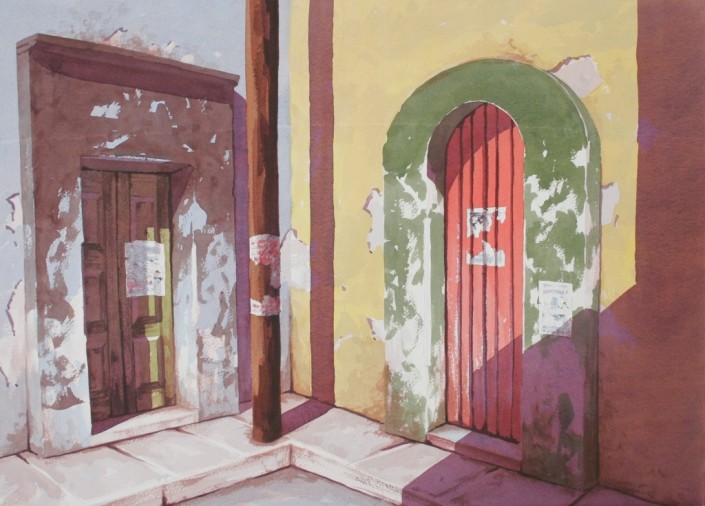Interviews with other artists
"I'm not really interested in easy things." he said. "The thrill is overcoming problems one by one so there are small and larger rewards all the time. I always get the best results when I'm not really thinking too hard, it’s sort of existential."
I don't know any one else like that. ;)
“I find it a challenge. It is the hardest medium, I think, because you simply can’t make a mistake there is no room for errors in watercolours. It is very skilful. To paint at the level I'm painting at is very, very skilful; it looks simple but it’s not. There is a value in skill no matter what you’re doing. To be skilful in anything gives it worth. But that’s not why I paint in it. I like it’s immediacy, I like to complete a painting in a relatively short sitting. I like to get a result. I'm not the type of artist who can drag a painting on for days or weeks.”
What are your essential materials for watercolour painting? Paper/brushes/paints etc?
“In general I use Waterford 425gsm, rough paper.
I like Pro Arte brushes. They are a synthetic brush made from Prolene. I think the whole sable –v- synthetic thing is a myth, it’s just marketing. It's as soft as can be and is quite hard wearing. I paint for around thirty hours a week - a size 10 brush costs me around £10 and I will get through one in a week. I keep brushes in various states of degradation for different brush strokes. I’ll use around 15-20 different brushes in a day.
I use Winsor & Newton Artist Quality paint. I buy it in 37ml tubes for economy.”
Is there any significance to your using wine glasses for mixing paint?
“I use wine glasses to mix my paint as there is no waste – everything mixes to brown eventually. They give me a clear, consistent wash. I use syringes or pipettes to measure the paint. The more I go on with watercolour the more crucial the whole mixing thing becomes. If the colours and tone are right the painting will pull its self together.”
What is your preferred method for reserving the white of the paper? What are your views on the use of white paint or masking fluid?
“I'm a total purest. I have never used white paint in my life. For beginners, using masking fluid is fair enough, but for me it’s all about the skill of being able to leave the white paper. On your second, third, fourth stage you’re leaving areas of light paint behind. Watercolour IS all about what you leave out, not what you put on.”
You mainly paint landscapes. In your opinion is it a help or a hindrance to limit subject matter when you're learning to paint?
“I would say it’s a hindrance. I think when you’re learning paint loads of different subjects, really concentrate on drawing and more on tone than colour. Be as broad as possible and work out what you like painting as you should really only be painting what you like. By experimenting in various subjects when you’re learning you’ll discover what floats your boat.”
Oil paintings have always demanded a higher price than watercolour paintings and art galleries seem to favour oil paintings. What are your thoughts on this and do you feel this will change in the future?
“I think it definitely will change, I'm at the fore front in terms of trying to change that. The price I'm getting for some of my watercolours now is relative to a lot of contemporary oil painters that are around. It is historically ridiculous, it’s going back 200 years to Turner and people like that. Watercolour was always associated as a sketching medium, a pre-view to oil, field work, and not a medium in itself and I think it will change. Watercolour is such a vibrant medium, I guess oil has its moments, but I think it’s a bit of a dead medium personally.”
You sell your original artwork on Twitter for £100, including a frame and postage. How and why? Are they the "drafts" before the real thing?
“Yes, it’s all draft work. Every painting, when I'm working out a large piece, starts with very small sketches. They help me develop subjects and I have to make a living too so it works on a commercial level. A lot of people come back for more and then move on to buy bigger pieces. I've been painting since I was ten years old so it’s taken me twenty-eight years to develop my style.”
“Everything comes from a red, yellow and blue. I use Cadmium Yellow, occasionally Naples Yellow, Alizarin Crimson, occasionally Cadmium red and I use Cerulean, Cobalt and Ultramarine as my three blues.”
I find social media sites take up too my time when I could be painting. What benefits have you gained by using social media sites and have you experienced any drawbacks?
“Find which one works for you. There is no doubt to be successful on any social media forum takes time. There is no dipping your toe in the water, you may as well not bother, immerse yourself in it. I have found Twitter works for me. I devote at least fifteen hours a week to it but then I don’t advertise. I get 50, 60, 70 followers a day, I've got about eighty thousand followers now – you can’t really ignore it. It’s taken me seven years to get to the point I'm at. I don’t think there are any downsides – why would there be?”
What is/are your goal(s) as an artist?
“I think that if I continue to push by myself, explore, be true to my own worth and not go commercial, be true to me then all my other goals will fall into place. Provided I work hard. If I look at where I was 10 years ago and where I am now on that same trajectory, in 10 years time, I’ll be absolutely fine. That’s the only way I can look at it.”
Watercolour painting is full of "rules". What rules, if any, do you break?
“Well, you are constricted by the medium. Have a look at my website and read about my Überpainting style which is like screen printing. I compare it to a sonnet where I really have got a structure. There are rules I uphold. Each painting is made within a rule-set which is tighter than the rules you already have in watercolour. I put dark colours over light colour, I've taken that concept and redefined it – you've got to try and break rules but at the end of the day it’s physics and you can’t beat physics. That’s all watercolour is – physics. It’s putting grains of sediment in a certain way, it’s layering them, it’s just physics.”
“Don’t be afraid.
…don’t fear the paper, if you make a mistake, start again!”
http://mjforster.com



 RSS Feed
RSS Feed